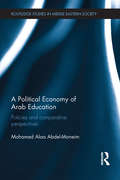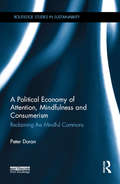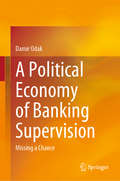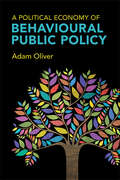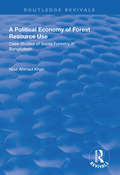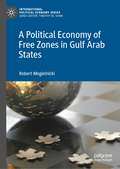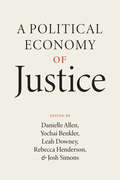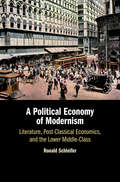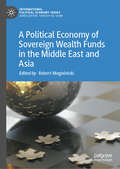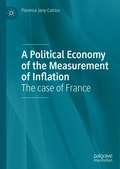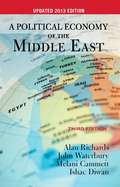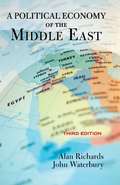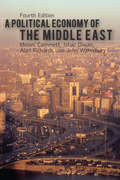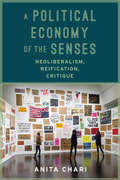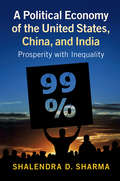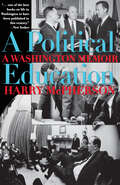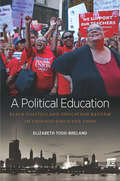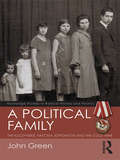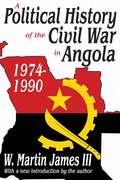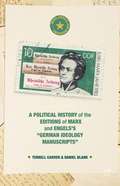- Table View
- List View
A Political Economy of American Hegemony
by Thomas OatleyIn A Political Economy of American Hegemony, Thomas Oatley explores how America's military buildups have produced postwar economic booms that have culminated in monetary and financial crises. The 2008 subprime crisis - as well as the housing bubble that produced it - was the most recent manifestation of this buildup, boom, and bust cycle, developing as a consequence of the decision to deficit-finance the wars in Afghanistan and Iraq. Earlier instances of financial crises were generated by deficit-financed buildups in the 1980s and the late 1960s. The buildup, boom, and bust pattern results from the way political institutions and financial power shape America's response to military challenges: political institutions transform increased military spending into budget deficits, and financial power enables the United States to finance these deficits by borrowing cheaply from the rest of the world. Oatley examines how this cycle has had a powerful impact on American and global economic and financial performance.
A Political Economy of Arab Education: Policies and Comparative Perspectives (Routledge Studies in Middle Eastern Society)
by Mohamed Alaa Abdel-MoneimThe failure of reform policies in areas of critical importance to Arab populations such as health and education played a central role in igniting the Arab Awakening, yet this policy perspective has been largely absent from recent studies of the region. Arab regimes most reliant on repression to guarantee their survival were also those most vulnerable to mass politics. Where threats to regime survival have been limited, so have more meaningful reforms been possible, finding an alternative to political change through focusing on "soft policy" areas such as education. A Political Economy of Arab Education offers a comprehensive analysis of K-12 education systems in Arab countries, deepening understanding of their administrative structures and outcomes, and exploring how political considerations have impacted the ability of Arab regimes to engage in meaningful reform. Taking a unique comparative political economy perspective, it examines the reasons behind policy stagnation in Arab countries, addressing the effects of size, history and political stability on the design and implementation of policies and administrative structures. Its informed analysis and comparison of education systems provides new insight into Arab regimes and highlights factors pulling them towards either stagnation or reform. Examining the sustainability of reforms and establishing the benefits of engaging in meaningful change, this book sheds light on why some regimes survived the Arab Spring while others crumbled and formulates convincing predictions on the potential for future regime change in the region. This book will be of key interest to students and scholars of Middle Eastern Studies, International and Comparative Education and Development Studies.
A Political Economy of Attention, Mindfulness and Consumerism: Reclaiming the Mindful Commons (Routledge Studies in Sustainability)
by Peter DoranThe power of capital is the power to target our attention, mould market-ready identities, and reduce the public realm to an endless series of choices. This has far-reaching implications for our psychological, physical and spiritual well-being, and ultimately for our global ecology. In this consumer age, the underlying teachings of Buddhist mindfulness offer more than individual well-being and resilience. They also offer new sources of critical inquiry into our collective condition, and may point, in time, to regulatory initiatives in the field of well-being. This book draws together lively debates from the new economics of transition, commons and well-being, consumerism, and the emerging role of mindfulness in popular culture. Engaged Buddhist practices and teachings correspond closely to insights in contemporary political philosophical investigations into the nature of power, notably by Michel Foucault. The 'attention economy' can be understood as a new arena of struggle in our age of neoliberal governmentality; as the forces of enclosure – having colonized forests, land and the bodies of workers – are now extended to the realm of our minds and subjectivity. This poses questions about the recovery of the 'mindful commons': the practices we must cultivate to reclaim our attention, time and lives from the forces of capitalization. This is a valuable resource for students and scholars of environmental philosophy, environmental psychology, environmental sociology, well-being and new economics, political economy, environmental politics, the commons and law, as well as Buddhist theory and philosophy.
A Political Economy of Banking Supervision: Missing a Chance
by Damir OdakThis book examines the effect of banking on the real economy and society, focusing on banking supervision as the decisive factor in steering banking activities and determining the social outcome of the game of finance. Banking is like a cardiovascular system for our society. If it functions correctly, it allows the economy to operate smoothly. On the other hand, if it malfunctions it becomes a doomsday device. This creates an asymmetry of risks – the asymmetry between the potential dire consequences and the modest rewards of accepting those risks. Banking was one of the critical technological factors enabling the transition from the middle ages and the creation of modern society. However, while today it contributes little to economic growth, its malfunction has a profound and lasting adverse impact.The book explains why, how and what. Why is it important to keep tight supervision of the banks? How can banking supervision improve stability, not only of the financial system but also of the whole human society? What went wrong with the regulation in the past?
A Political Economy of Behavioural Public Policy
by Adam OliverBehavioural public policy has thus far been dominated by approaches that are based on the premise that it is entirely legitimate for policymakers to design policies that nudge or influence people to avoid desires that may not be in their own self- interest. This book argues, instead, for a liberal political economy that radically departs from these paternalistic frameworks. Oliver argues for a framework whereby those who impose no substantive harms on others ought to be free of manipulative or coercive interference. On this view, BPP does not seek to “correct” an individual's conception of the desired life. This book is the third in a trilogy of books by Adam Oliver on the origins and conceptual foundations of BPP.
A Political Economy of Forest Resource Use: Case Studies of Social Forestry in Bangladesh (Routledge Revivals)
by Niaz Ahmed KhanPublished in 1998. An International monograph publishing series covering new research into the ‘green’ issues such as government, corporate and public responses to environmental hazards, the economics of green policies and the effectiveness of environmental protection programmes.
A Political Economy of Free Zones in Gulf Arab States (International Political Economy Series)
by Robert MogielnickiThis is the first book-length empirical study of free zones (FZs) in Gulf Cooperation Council (GCC) countries. The volume systematically illustrates the development processes behind FZs in Gulf Arab states and assesses the impact of these commercial entities on regional integration, global trade and investment trends, and the Gulf’s foreign relations. In the process, the work maps how economic strategies involving FZs evolve alongside varying levels of resource availability and state capacity on a local level while also revealing how development paths in Gulf Arab states are linked to regional and global accumulation circuits. FZ development is an under-examined topic in the wider literature on the Gulf. The empirical findings and theoretical implications of the work therefore offer an original contribution to prevailing political economy discussions concerning the Gulf region.
A Political Economy of Justice
by Leah DowneyDefining a just economy in a tenuous social-political time. If we can agree that our current social-political moment is tenuous and unsustainable—and indeed, that may be the only thing we can agree on right now—then how do markets, governments, and people interact in this next era of the world? A Political Economy of Justice considers the strained state of our political economy in terms of where it can go from here. The contributors to this timely and essential volume look squarely at how normative and positive questions about political economy interact with each other—and from that beginning, how to chart a way forward to a just economy. A Political Economy of Justice collects fourteen essays from prominent scholars across the social sciences, each writing in one of three lanes: the measures of a just political economy; the role of firms; and the roles of institutions and governments. The result is a wholly original and urgent new benchmark for the next stage of our democracy.
A Political Economy of Justice
by Leah DowneyDefining a just economy in a tenuous social-political time. If we can agree that our current social-political moment is tenuous and unsustainable—and indeed, that may be the only thing we can agree on right now—then how do markets, governments, and people interact in this next era of the world? A Political Economy of Justice considers the strained state of our political economy in terms of where it can go from here. The contributors to this timely and essential volume look squarely at how normative and positive questions about political economy interact with each other—and from that beginning, how to chart a way forward to a just economy. A Political Economy of Justice collects fourteen essays from prominent scholars across the social sciences, each writing in one of three lanes: the measures of a just political economy; the role of firms; and the roles of institutions and governments. The result is a wholly original and urgent new benchmark for the next stage of our democracy.
A Political Economy of Justice
by Leah DowneyDefining a just economy in a tenuous social-political time. If we can agree that our current social-political moment is tenuous and unsustainable—and indeed, that may be the only thing we can agree on right now—then how do markets, governments, and people interact in this next era of the world? A Political Economy of Justice considers the strained state of our political economy in terms of where it can go from here. The contributors to this timely and essential volume look squarely at how normative and positive questions about political economy interact with each other—and from that beginning, how to chart a way forward to a just economy. A Political Economy of Justice collects fourteen essays from prominent scholars across the social sciences, each writing in one of three lanes: the measures of a just political economy; the role of firms; and the roles of institutions and governments. The result is a wholly original and urgent new benchmark for the next stage of our democracy.
A Political Economy of Modernism: Literature, Post-Classical Economics, and the Lower Middle-Class
by Ronald SchleiferIn A Political Economy of Modernism, Ronald Schleifer examines the political economy of what he calls 'the culture of modernism' by focusing on literature and the arts; intellectual disciplines of post-classical economics; and institutional structures of corporate capitalism and the lower middle-class. In its wide ranging study focused on modernist writers (Dreiser, Hardy, Joyce, Stevens, Woolf, Wells, Wharton, Yeats), modernist artists (Cézanne, Picasso, Stravinsky, Schoenberg), economists (Jevons, Marshall, Veblen), and philosophers (Benjamin, Jakobson, Russell), this book presents an institutional history of cultural modernism in relation to the intellectual history of Enlightenment ethos and the social history of the second Industrial Revolution. It articulates a new method of analysis of the early twentieth century - configuration and modeling - that reveals close connections among its arts, understandings, and social organizations.
A Political Economy of Sovereign Wealth Funds in the Middle East and Asia (International Political Economy Series)
by Robert MogielnickiThis book on sovereign wealth funds (SWFs) in the Middle East and Asia brings together leading scholars and practitioners focusing on investment trends in two prominent and influential regions of the globe. The resulting political economy mapping of these investment vehicles breaks new ground in elucidating prominent geographic contours of the global SWF sector. The interregional framing likewise reveals the strategic economic significance of SWF-facilitated linkages between the Middle East and Asia. The work probes three cross-cutting themes. The initial chapters explore the dynamics of competition and collaboration amongst Middle Eastern and Asian SWFs. This book then turns to the energy, environmental, and sustainability issues shaping SWF investment behavior. Finally, country-specific chapters examine how and why SWF investments materialize within key markets. These interregional connections enabled by sovereign wealth represent an expanding economic frontier with long-term implications for the Middle East, Asia, and the global economy.
A Political Economy of the Measurement of Inflation: The case of France
by Florence Jany-CatriceInflation should no longer be a politically sensitive indicator. Indeed, since the early 1980s, macroeconomic policies have managed to contain it. Yet the consumer price index (CPI), which is the main indicator for measuring inflation, remains very frequently consulted by citizens, due to its multiple uses. The CPI is used for indexing wages, pensions, but also various contracts such as food pensions. It is also used by National Accounts to deflate macroeconomic values and to provide data in “real” terms. But how is this CPI measured? index? What reforms have happened to give shape to the XXIst century CPI? This book presents the CPI based on the study of the controversies that have marked its history. Set in both the socio-economic and ideas contexts, these controversies show the eminently conventional and political nature of the CPI and, therefore, of many other macroeconomic indicators, such as growth or productivity.
A Political Economy of the Middle East
by John Waterbury Alan Richards Melani Cammett Ishac DiwanThis integrated, analytic text presents a comprehensive analysis transformation and development of the political economy in the Middle East over the past several decades. In this updated third edition of A Political Economy of the Middle East, the book retains its focus on the interaction of economic development processes, state systems, and social actors even as it also:*Documents the many changes in demography, education, labor markets, urbanization, water and agriculture, and international labor migration in the Middle East in recent years;*Considers the effect of rising oil prices on reinforcement of authoritarian governance in the region;*Refines its assessment of "the Washington Consensus" to provide a more nuanced approach to the issue of the shifting balance of state and market in economic growth and reform;*Presents Islamism as a vital force in the region that is nonetheless a vast, diverse social movement with many conflicting participants;*Explores the impact of the Arab Spring and subsequent events to the issues raised throughout the textbook in a wholly new chapter.
A Political Economy of the Middle East
by John Waterbury Alan RichardsThis integrated, analytic text presents a comprehensive analysis of the transformation of the political economy of development in the contemporary Middle East over the past several decades. Extensively rewritten and revised, the third edition of A Political Economy of the Middle East retains a focus on the interaction of economic development processes, state systems, and social actors even as it also: Documents the many changes in demography, education, labor markets, urbanization, water and agriculture, and international labor migration in the Middle East in recent years; Considers the effect of rising oil prices on reinforcement of authoritarian governance in the region; Refines its assessment of "the Washington Consensus” to provide a more nuanced approach to the issue of the shifting balance of state and market in economic growth and reform (in an entirely rewritten Chapter 9); Presents Islamism as a vital force in the region that is nonetheless a vast, diverse social movement with many conflicting participants (in a wholly revised Chapter 14).
A Political Economy of the Middle East
by John Waterbury Alan Richards Melani Cammett Ishac DiwanA landmark analysis of the ongoing socioeconomic transformations of the Middle East, now with an epilogue on the ArabaSpring. "
A Political Economy of the Middle East
by Melani CammettA Political Economy of the Middle East is the most comprehensive analysis of developments in the political economy of the region over the past several decades, examining the interaction of economic development processes, state systems and policies, and social actors in the Middle East.The fourth edition, with new authors Melani Cammett and Ishac Diwan, has been thoroughly revised, with two new introductory chapters that provide an updated framework with which to understand and study the many changes in demography, education, labour markets, urbanization, water and agriculture, and international labour migration in the recent years. The new edition also includes: a new chapter that charts the political economy of the Gulf states and, in particular, the phenomenal growth of oil economies a new chapter on the rise of "crony capitalism" and increased coverage of the changes in civil society and social movements in the region, including an exploration of the causes, dynamics, consequences, and aftermath of the Arab uprisings.
A Political Economy of the Senses: Neoliberalism, Reification, Critique (New Directions in Critical Theory #2)
by Anita ChariAnita Chari revives the concept of reification from Marx and the Frankfurt School to spotlight the resistance to neoliberal capitalism now forming at the level of political economy and at the more sensate, experiential level of subjective transformation. Reading art by Oliver Ressler, Zanny Begg, Claire Fontaine, Jason Lazarus, and Mika Rottenberg, as well as the politics of Occupy Wall Street, Chari identifies practices through which artists and activists have challenged neoliberalism's social and political logics, exposing its inherent tensions and contradictions.
A Political Economy of the United States, China, and India: Prosperity With Inequality
by Shalendra D. SharmaThe precipitous rise in global and national economic inequality, which the inexorable force of globalization promised to address with affluence and abundance for all, has returned with a vengeance. The problem of worsening socioeconomic inequality and how best to ameliorate this pernicious resurgence occupies center stage of national and international politics. This study investigates the coexistence of high rates of economic growth and unparalleled prosperity (including a review of the decline in poverty levels in China and India and many other developing countries) with rises in income and wealth inequality in the United States, China, and India.<P><P> This book examines the overall effectiveness of the measures taken by these three countries to address such anomalies, and what they should do to tackle the problem of widening inequality. This study breaks new ground by providing an original comparative analysis of the challenges facing the world's three major economies.<P> Addresses why both democratic and authoritarian governance have failed to promote more equitable development.<P> Provides nuanced insights into the roots of inequality crises.<P> Offers solutions to address global economic inequality.
A Political Education: A Washington Memoir
by Harry McPhersonThis classic political memoir offers an insider’s view of Washington in the ‘50s and ‘60s—with a preface by the author reflecting on the Clinton era.A Texas native, Harry McPherson went to Washington in 1956 as an assistant to Senate Majority Leader Lyndon Johnson. He served in key posts under Presidents Kennedy and Johnson, including as Johnson’s special counsel and speechwriter.In Political Education, McPherson offers a vividly evocative portrait of Johnson’s tumultuous presidency and of the conflicts and factions of the president's staff. Long regarded as a political classic, it is essential reading for anyone seeking to understand national politics of the period.In 1995, McPherson added a preface discussing how Washington had changed since the Johnson era. In it he suggests what lessons Bill Clinton could have learn from Johnson’s time in the Oval Office.
A Political Education: A Washington Memoir
by Harry McPhersonThis classic political memoir offers an insider’s view of Washington in the ‘50s and ‘60s—with a preface by the author reflecting on the Clinton era.A Texas native, Harry McPherson went to Washington in 1956 as an assistant to Senate Majority Leader Lyndon Johnson. He served in key posts under Presidents Kennedy and Johnson, including as Johnson’s special counsel and speechwriter.In Political Education, McPherson offers a vividly evocative portrait of Johnson’s tumultuous presidency and of the conflicts and factions of the president's staff. Long regarded as a political classic, it is essential reading for anyone seeking to understand national politics of the period.In 1995, McPherson added a preface discussing how Washington had changed since the Johnson era. In it he suggests what lessons Bill Clinton could have learn from Johnson’s time in the Oval Office.
A Political Education: Black Politics and Education Reform in Chicago since the 1960s (Justice, Power, and Politics)
by Elizabeth Todd-BrelandIn 2012, Chicago's school year began with the city's first teachers' strike in a quarter century and ended with the largest mass closure of public schools in U.S. history. On one side, a union leader and veteran black woman educator drew upon organizing strategies from black and Latinx communities to demand increased school resources. On the other side, the mayor, backed by the Obama administration, argued that only corporate-style education reform could set the struggling school system aright. The stark differences in positions resonated nationally, challenging the long-standing alliance between teachers' unions and the Democratic Party.Elizabeth Todd-Breland recovers the hidden history underlying this battle. She tells the story of black education reformers' community-based strategies to improve education beginning during the 1960s, as support for desegregation transformed into community control, experimental schooling models that pre-dated charter schools, and black teachers' challenges to a newly assertive teachers' union. This book reveals how these strategies collided with the burgeoning neoliberal educational apparatus during the late twentieth century, laying bare ruptures and enduring tensions between the politics of black achievement, urban inequality, and U.S. democracy.
A Political Family: The Kuczynskis, Fascism, Espionage and The Cold War (Routledge Studies in Radical History and Politics)
by John GreenThe Kuczynskis were a German-Jewish family of active anti-fascists who worked assiduously to combat the rise of Nazism before and during the course of the Second World War. This book focuses on the family of Robert and his wife Berta – both born two decades before the end of the nineteenth century – and their six children, five of whom became communists and one who worked as a Soviet agent. The parents, and later their children, rejected and rebelled against their comfortable bourgeois heritage and devoted their lives to the overthrow of privilege and class society. They chose to do this in a Germany that was rapidly moving in the opposite direction. With the rise of German nationalism and then Hitler fascism, the family was confronted with stark choices and, as a result of making these choices, suffered persecution and exile. Revealing how these experiences shaped their outlook and perception of events, this book documents the story of the Kuczynskis for the first time in the English language and is a fascinating biographical portrait of a unique and radical family.
A Political History Of The Civil War In Angola, 1974-1990 (The East-south Relations Ser.)
by W. JamesWhen Portugal’s colonial rule in Angola ended in 1974, three liberation groups—UNITA (National Union for the Total Independence of Angola), FNLA (National Front for the Liberation of Angola), and MPLA (Popular Movement for the Liberation of Angola)—agreed to a tripartite movement for the fledgling nation. Conflicts quickly arose and the MPLA, with Cuban and Soviet assistance, drove its rivals from the capital, instigating a civil war, which continues into three periods (1975-1991, 1992-94, and 1998-2002). This volume covers the first period, focusing on the political history of the UNITA movement and its struggles with the MPLA. <p><p> The Angolan civil war was the product of personal jealousies, contrasting ideologies, and ethnic animosities. From its inception, the conflict between UNITA and Angola’s Marxist government was an international affair involving the U. S., the USSR, China, and many African states: W. Martin James III, who wrote his book near the close of the first period of civil war, contends that despite Gorbachev’s "new thinking" and talk of peaceful solutions to regional conflicts, Soviet policy toward Angola marked a reversion to the Brezhnev Doctrine. The biggest MPLA-Cuban offenses occurred during Gorbachev’s tenure with Soviet advisers at the brigade level directing an MPLA offensive. <p> American policy toward Angola is also examined here. This is the first book to emphasize the dynamic role of UNITA in the Angolan liberation movement. James acknowledges that the importance of foreign powers in guaranteeing a government of national reconciliation. Just as important are strategies of compromise requiring trust in a political context where it is violated and submission for the common good where defiance is a remnant of the colonial past. Foreign policy analysts, African area specialists, and scholars of post-colonial history find this volume indispensible.
A Political History Of The Editions Of Marx And Engels’s "german Ideology Manuscripts"
by Terrell Carver Daniel BlankSince the 1920s, scholars have promoted a set of manuscripts, long abandoned by Marx and Engels, to canonical status in book form as The German Ideology, and in particular its 'first chapter,' known as 'I. Feuerbach. ' Part one of this revolutionary study relates in detail the political history through which these manuscripts were editorially fabricated into editions and translations, so that they could represent an important exposition of Marx's 'theory of history. ' Part two presents a wholly-original view of the so-called 'Feuerbach' manuscripts in a page-by-page English-language rendition of these discontinuous fragments. By including the hitherto devalued corrections that each author made in draft, the new text invites the reader into a unique laboratory for their collaborative work. An 'Analytical Introduction' shows how Marx's and Engels's thinking developed in duologue as they altered individual words and phrases on these 'left-over' polemical pages.

